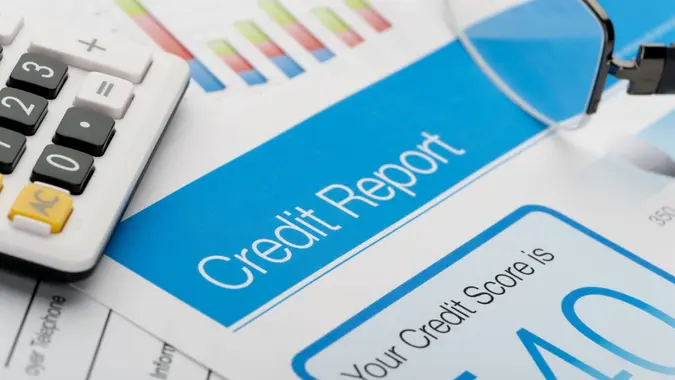5 Ways Divorce Can Affect Your Credit Score

Commitment to Our Readers
GOBankingRates' editorial team is committed to bringing you unbiased reviews and information. We use data-driven methodologies to evaluate financial products and services - our reviews and ratings are not influenced by advertisers. You can read more about our editorial guidelines and our products and services review methodology.

20 Years
Helping You Live Richer

Reviewed
by Experts

Trusted by
Millions of Readers
Many people believe getting divorced automatically hurts your credit, but that is not true. The act of getting divorced itself won’t damage your credit because federal law states your marital status cannot impact your creditworthiness — lenders are prohibited from even asking about your marital status unless it could directly affect your loan.
The myth really comes from the indirect impact the financial issues surrounding divorce have on your credit score. Here are some examples of how divorce can negatively impact your credit score.
See 5 ways to protect your assets during a divorce >>>
How These 5 Money Issues Can Affect Your Credit After a Divorce
1. Your ex files for bankruptcy
The divorce decree will state who is responsible for any accounts (including debt) opened during the marriage, but it does not absolve anyone from responsibility to pay in the lender’s eyes. So even if your divorce decree says your ex-spouse is responsible for paying any joint debt, the lenders may still come after you if your ex declares bankruptcy. You can try to fight this issue in family court, which will take time and may be more costly than paying the debt itself. Or it might be time to file for bankruptcy to remove yourself from the debt, even if bankruptcy will have the unfortunate side effect of tanking your credit score.
2. Your ex still has access to your accounts
An angry ex-spouse can rack up debt on joint credit cards, drain joint bank accounts and leave you broke. Now, not all of this is necessarily legal, but if your ex (or anyone else) is an authorized user on any of your credit cards, you are the one responsible for any debt incurred. An ex might also still have access to account information or logins to charge credit cards or bank accounts that are solely yours.
With authorized or unauthorized access your accounts, your ex-spouse can rack up debt that will count against your credit score. The best thing to do is change all your banking passwords and remove your ex’s name from all your accounts.
Related: The 7 Worst Money Mistakes People Make in the Name of Love
3. You have high legal bills
Despite the numerous ads touting quick and easy divorce help, getting divorced isn’t cheap. Divorce attorney’s fees can vary and a lot of the legal costs depend on your assets, debts and other issues that need to be resolved. A study from NOLO.com found the typical divorce attorney charged about $250 an hour and the total bill for divorce legal fees ran from $1,000 to $30,000.
If you rack up a lot in attorney’s fees, you may have a hard time paying off both those fees and your own bills — especially if your ex-spouse was the breadwinner in the partnership. This can lead to a cash shortage, late payments and high credit utilization, all of which have a negative impact on your credit. The best way to avoid this is by drastically downgrading your lifestyle to reduce expenses or increasing your income with a second job or side work until you can pay off the divorce costs and get back on your feet.
4. Your ex doesn’t pay your joint bills
As previously mentioned, the divorce decree will determine which spouse is responsible for joint debt but lenders only care about whose names are on the account. Let’s say your ex got the house, but the mortgage is still in both your names. If your ex-spouse makes a late mortgage payment or doesn’t pay at all, your credit is going to take a big hit. This can even apply to other shared utilities like electricity or internet for which you were both originally listed as account holders.
For this reason, many divorcing couples decide to close or refinance joint debt to get one person’s name off the loan. If you have joint bills or debts with your ex, you can protect your credit by either getting your name off the accounts or by making any missed payments until you can collect the funds in court. You should also have your name removed from any previously-shared service accounts like phone bills, utilities, internet or cable.
Read: How to Refinance Your Home After a Divorce
5. Your ex steals your identity
Divorce can get messy and ugly, and a disgruntled ex-spouse has access to all your personal information including your social security number, birth date and mother’s maiden name. It’s completely illegal but all too easy for your ex to steal your identity and secretly rack up debt in your name as an act of revenge. You may not even know about these illegal accounts until they’ve already gone unpaid and started to damage your credit.
Protect yourself by signing up for a credit monitoring service that will alert you to any new accounts opened in your name or changes to your credit history. If you suspect your ex-spouse has stolen your identity, contact the credit bureaus and put a 90-day fraud alert on your credit accounts.
When you get divorced, you are breaking up with your spouse, not your creditors. A divorce decree won’t absolve your responsibility to pay your lenders. The best way to protect yourself and your credit score is by removing your name from as many accounts as possible. If you can’t do that, then make sure your ex is following the arrangement set forth in the divorce decree, or you’ll have to make those payments yourself or declare bankruptcy to completely remove your responsibility to pay.
 Written by
Written by 
























